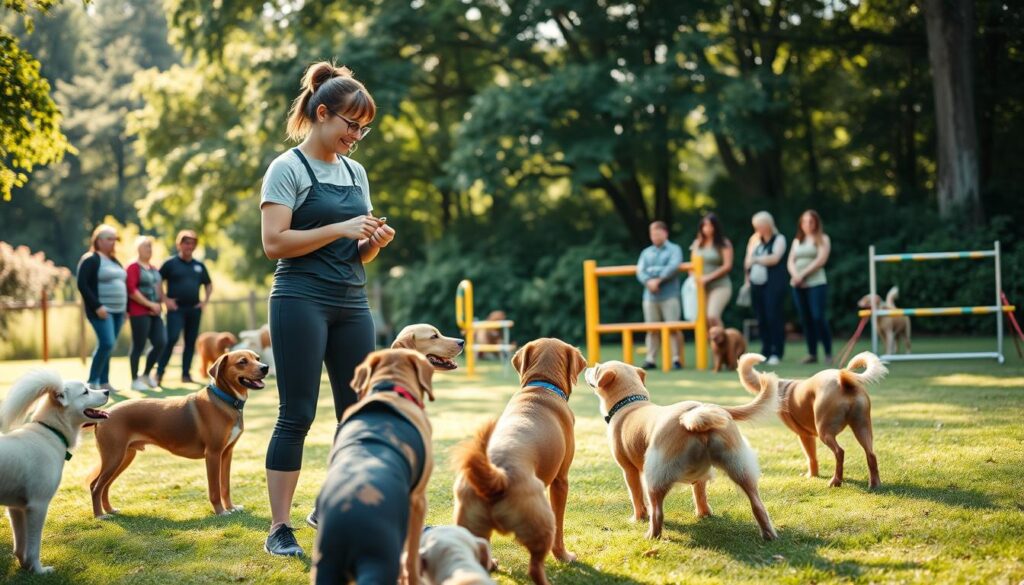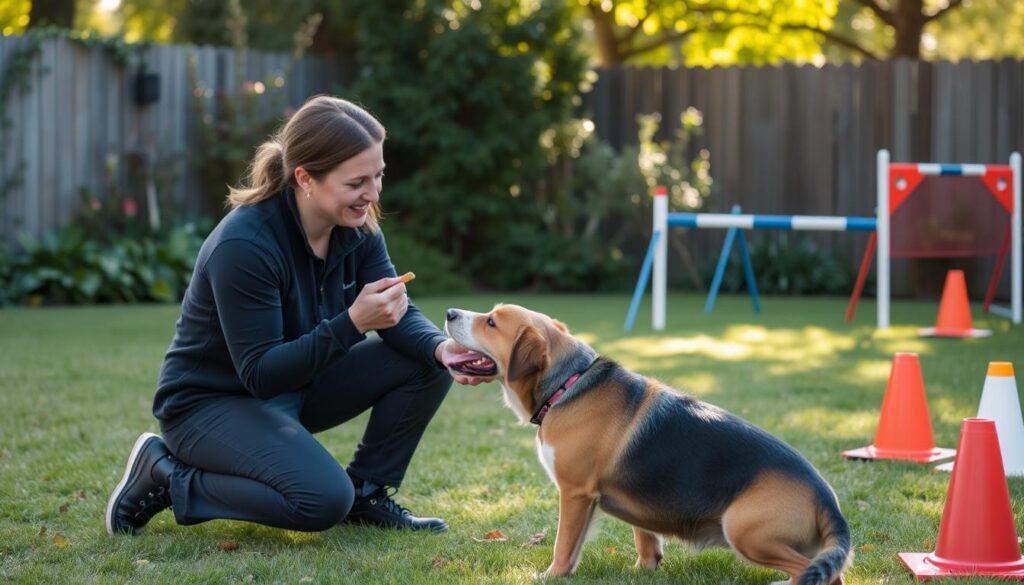Professional Dog Trainer: Expert Canine Education
Unlock your dog’s full potential with a professional dog trainer! Expert guidance for better behavior and enhanced bond.

A professional dog trainer is key in making the bond between dogs and their owners stronger. They use their knowledge of dog training and canine behavior to create training plans for each dog. Trainers from groups like the Certification Council for Professional Dog Trainers (CCPDT) and the International Association of Canine Professionals (IACP) can handle many behavioral issues. They make sure pets are well-behaved and obedient.
Trainers use modern education methods to teach dogs good behavior and obedience. They work on discipline and good habits in training sessions. This helps make homes peaceful places where dogs and their owners get along well. Thanks to their knowledge and patience, even tough dogs can become great pets.
Key Takeaways
- Professional dog trainers are essential for developing well-mannered pets through tailored education plans.
- Certified dog trainers possess dog training expertise and knowledge of canine behavior, resulting in effective obedience training.
- Organizations such as CCPDT and IACP certify trainers, ensuring they meet professional standards.
- The American Kennel Club (AKC) emphasizes the importance of professional dog training.
- Trainers address individual dog needs, fostering a stronger bond between owner and pet.
Introduction to Professional Dog Training
Professional dog training is more than just the basics that pet owners try at home. It uses special techniques and a deep understanding of dog behavior. This helps teach dogs the right behavior and obedience. Trainers create a specific training program for each dog, whether it’s for simple commands or complex dog behavior modification.
What is Professional Dog Training?
Certified trainers use a structured method to teach dogs obedience and improve their behavior. This process includes assessment, planning, and actual training. For example, Guide Dogs for the Blind shows how tailored training can greatly improve a dog’s abilities and behavior.
Benefits of Hiring a Professional Dog Trainer
Many pet owners see big benefits from professional dog training services. These benefits include better safety, improved social skills, and fewer behavioral issues. With dog behavior modification techniques, trainers can help with problems like too much barking or aggression. Happy clients share stories of the big changes in their pets, proving the value of professional help.
Essential Skills for Every Dog Trainer
Learning key skills is vital for those aiming to be great in dog training. These skills include knowing how dogs think and using the right training methods. Let’s look at the main abilities needed for a skilled dog trainer.

Patience and Consistency
Patience and consistency are key in dog training. A good trainer must show these traits to make sure training sticks. Being consistent helps make behaviors strong and predictable for the dog.
Knowledge of Canine Behavior
Deep knowledge of canine psychology is a must. This means knowing how different breeds act and how they react to things. Trainers keep up with new research by reading veterinary behavior journals, making them better at their job.
Effective Communication Skills
Good communication skills with dogs and their owners are crucial. Clear and direct commands help the dog know what’s expected. Trainers improve their skills by going to workshops led by top behaviorists, leading to better training results.
Types of Dog Training Services
Professional dog training offers many methods for each dog’s unique needs. Obedience classes are a top choice, teaching dogs to follow commands and behave well. These classes are perfect for dogs learning to listen and respond consistently.

Private dog training gives dogs one-on-one attention. It’s great for dogs with special needs or behavioral issues. This method tailors training to the dog’s personality and requirements.
Group training sessions are great for socializing dogs. They teach dogs how to get along with others. This helps dogs feel part of a community and respect each other.
Puppy training programs are key for young dogs. They teach important skills and social behaviors early on. Puppies learn about house rules, meeting other dogs, and basic commands.
For dogs with specific issues, behavioral training is available. It helps with problems like aggression or anxiety. This training aims to make life better for dogs and their owners.
How to Choose the Right Dog Trainer
Finding the right dog trainer is key to your pet’s success and a positive learning experience. Start by looking at their professional background, experience, and what they specialize in. This will help you find a trainer who meets your needs and your dog’s needs too.
Credentials and Certifications
Certifications show a trainer’s professionalism and skill. Check for certifications from groups like the Certification Council for Professional Dog Trainers (CCPDT) and the International Association of Canine Professionals (IACP). These groups make sure trainers pass tough tests and follow ethical training rules. Always check the certifications are real by looking at the organizations’ websites.
Experience and Specializations
Experience matters a lot when picking a dog trainer. A trainer with lots of experience knows a lot from working with different breeds and personalities. Think about what kind of training you want, like agility, obedience, or therapy dog training. Trainers with special skills can tackle specific problems or goals better.
When picking a trainer, look at their background and how they train. It’s good to talk to them or watch a training session to make sure you’re a good match. By looking at their credentials, experience, and special skills, you can pick a trainer who will make training fun and effective for you and your dog.







